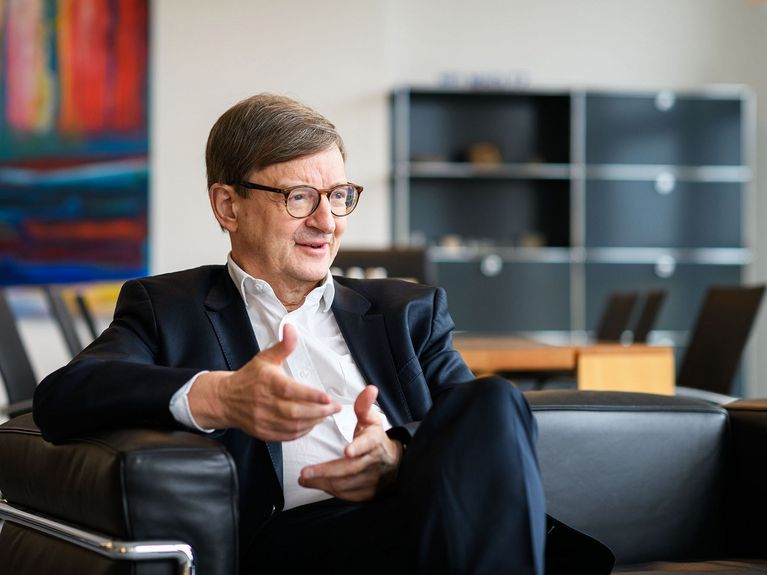Interview
“Only through dialog can we find solutions to the pressing challenges of our time”

Picture: Phil Dera
Israel is one of the most important partners for German science. The country invests more in research and development than almost any other. With its dynamic start-up scene, it is considered a high-tech nation. However, since the Hamas attack on October 7, 2023 and the ensuing war, the country has been in a crisis that has also affected science. Helmholtz President Otmar D. Wiestler met with partner organizations for two days to discuss the current situation and joint projects in difficult times.
Mr. Wiestler, after more than nine months of war, Israel is in the midst of a profound turning point that has also left its mark on scientific institutions. How do you perceive the country today?
You have to distinguish between two impressions. When you come to the country, fly to Tel Aviv, drive through the city and visit institutions, it initially feels more or less as it always has. On the surface, there is an almost conspicuous normality to daily life. It is remarkable how people manage to carry on under the most difficult conditions. However, if you look behind the scenes and talk to colleagues you know well, it becomes clear that the war has left its mark on the country and has also had a major impact on the scientific system.
This is your second trip to Israel this year. What has changed in the past few months?
The situation has definitely worsened in recent months. It is relatively obvious that the economy is in trouble. In discussions with our Israeli partners, we have also heard that science is coming under pressure. It is becoming increasingly challenging to recruit international talent. Science is paying a high price for what is happening politically in the country. There has been a change of mood since many countries turned their backs on Israel. We see the protests at universities and unfortunately also international calls to boycott scientific institutions in Israel.
What is your response to this?
We have a very clear answer to this: Together with the Alliance of Scientific Organizations, we are resolutely opposed to such calls for a boycott. Only through dialog can we find solutions to the pressing challenges of our time. We are therefore committed to ensuring that our ties with Israeli science remain as strong as ever. We are also campaigning for this in Brussels at EU level. We also ensure that scientists from Israel are represented at conferences, on committees and in other exchange formats. German-Israeli scientific relations are in some cases older than the diplomatic relations between the two countries. We should never underestimate this important connection. This is also in our scientific interest, as an impressive number of brilliant researchers work in Israel.
Which research projects did you talk about during the trip?
We held a good dozen discussions with partners from almost all of our research areas. Victor Malka from the Weizmann Institute, for example, is a pioneer in the field of laser-plasma-based electron irradiation for medical applications and works closely with a team at the HZDR in Dresden. This alternative to conventional accelerators has the potential to significantly simplify the radiotherapy of tumors, among other things. At Tel Aviv University, Yaron Oz and Haim Suchowski presented their groundbreaking work on encrypted quantum communication via satellites. With Ilana Berman-Frank from Haifa University, we discussed the progress made in a joint ocean research project with GEOMAR, which is looking at changes in the eastern Mediterranean from the coastal area to the deep sea, a region that is strongly influenced by both climate change and anthropogenic pressures. At the Hebrew University in Jerusalem, we have also agreed to continuously expand our successful cooperation in the field of entrepreneurship. These are just a few examples from a series of excellent projects.
Helmholtz has had an office in Tel Aviv for five years. What could a long-term vision for cooperation between the Helmholtz Association and Israel look like?
We should make good use of the special relationship that we have built up with Israeli science over the decades and systematically expand it. I see priorities in the fields of artificial intelligence, physics, biomedicine and climate research, among others. To this end, we need to further intensify the exchange of young scientists in particular. In addition to purely scientific collaboration, we want to involve industry and start-ups in particular to a greater extent. Our Innovation Summit, which we have been organizing for several years in cooperation with our partners from the Israel Innovation Authority in Tel Aviv, is a successful format that we are continuously developing further. During the trip, I discussed with Dror Bin, the CEO and Michael Kaschke how we can expand cooperation between science, industry partners and start-ups in both countries even further in the future. In Israel, there is more talent in a whole range of research areas than in almost any other place. This applies in particular to key technologies with high value creation potential. We should therefore also ask ourselves how we can make Germany more attractive for Israelis to set up companies here.
Background to the trip
Together with Maike Sander, Scientific Director of the Max Delbrück Center, and Michael Kaschke, President of the Stifterverband, Helmholtz President Otmar Wiestler visited several partners of the Helmholtz Association in Israel to discuss the scientific situation in the country and current research projects. They visited the Weizmann Institute, the Tel Aviv University and the Hebrew University. Talks were also held with a delegation from the University of Haifa and with the German Ambassador Steffen Seibert. A meeting with the Israel Innovation Authority and other representatives of the innovation ecosystem focused on how to further expand cooperation between academic and industry partners and start-ups in both countries in the future.
Readers comments